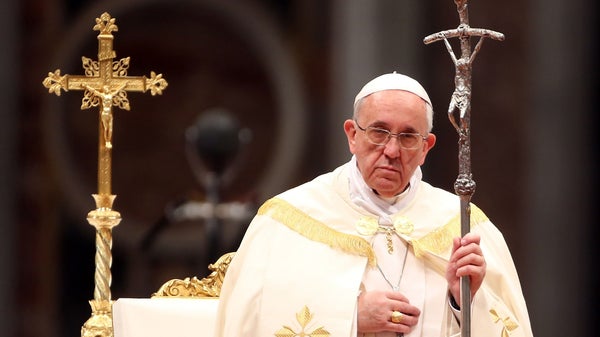The number of conservative voters who believe in climate change has almost doubled in the past two years, according to a new poll that attributes the rise in part to a lessening hostility toward the issue by Republican leaders.
Forty-seven percent of conservatives now say the climate is changing, a leap of 19 points since the midterm elections of 2014, according to the survey released yesterday by Yale and George Mason universities. The poll did not ask respondents whether climate change is caused by people.
The jump accounts for the single biggest change among all voting groups, and it could symbolize a softening among conservatives on an issue that has sharply divided the political parties, according to Anthony Leiserowitz, director of the Yale Program on Climate Change Communication.
On supporting science journalism
If you're enjoying this article, consider supporting our award-winning journalism by subscribing. By purchasing a subscription you are helping to ensure the future of impactful stories about the discoveries and ideas shaping our world today.
A number of things might have affected people’s attitudes, including Pope Francis’ encyclical calling for climate action, a record-warm winter and media coverage around the international agreement to reduce greenhouse gas emissions, according to the report.
Leiserowitz also attributes the rise in conservative belief to a reduction of attacks against climate science and policy in Congress and on the campaign trail.
“In this presidential race, climate change hasn’t come up on the Republican side at all,” he said. “It means that none of the political discourse, the discussion among the Republican Party right now, is addressing climate change at all. That’s actually an improvement in the discourse.”
That might have dulled the partisanship around global warming, he suggests, and made it easier for some conservatives to shift their views “because they’re not hearing a constant barrage of ‘This is a liberal hoax.’”
Despite the change, the findings don’t point to a shift in conservative views on the reasons behind warming. There hasn’t been a rise in the number of Republicans who believe that people are causing climate change.
The poll also found broad support for government policies to expand renewable energy and reduce greenhouse gas emissions. Eighty-four percent of all registered voters support more funding for energy sources like wind and solar, including 91 percent of Democrats and 75 percent of Republicans. A similar number, 81 percent of all voters, support giving tax rebates to people who buy energy-efficient cars or solar panels, including 91 percent of Democrats and 70 percent of Republicans.
On regulating carbon dioxide, 75 percent of all voters expressed support for that action, including 88 percent of Democrats and 61 percent of Republicans. A carbon tax on oil and gas companies netted less support among Republicans, at 47 percent, even as 86 percent of Democrats described it as a good idea.
GOP ‘out of step’
Perhaps one of the poll’s most relevant findings, related to the presidential race, underscores the passion that Democrats have for the climate issue. Among liberal Democratic voters, addressing global warming ranks as the sixth most important priority out of 23 policy issues, the poll found.
Leiserowitz said that’s a remarkable finding that suggests the spirited debate between Hillary Clinton and Sen. Bernie Sanders (I-Vt.) about the best approach to cutting emissions is energizing Democratic voters ahead of this fall’s general election.
Climate change trails the economy, health care, income inequality, protecting the environment and education as a “very important” issue to liberals. They see the climate issue as more important than some long-standing party priorities, including race relations, gun control, terrorism and Supreme Court nominations.
That raises concern among some Republicans who see climate change, and the GOP’s positions on it, as an electoral issue that helps Democrats.
“I think the key number in this report is how it is a motivating issue for liberal Democrats,” Christian Ferry, who ran Sen. Lindsey Graham’s (R-S.C.) presidential campaign, said in an email.
“I think if these trends continue, Republicans will find themselves out of step with voters who believe climate change is real,” he added. “I think Republicans should be trying to find areas of agreement with pro-environmental voters and seek to emphasize those areas rather than focus on the different views about whether or not climate change is real or the role mankind plays or doesn’t play in it.”
The poll shows that liberal and moderate Republicans list climate change near the bottom, at 21st of 23 important issues. Conservative Republicans rank it last.
The survey also finds that 43 percent of all voters would support a candidate who promises to take bold action to address warming, compared with 14 percent who say they would be less likely to vote for such a candidate.
It’s unlikely, however, that the presidential election will be decided by voters who support or oppose climate action.
“We find that it’s a very small proportion of Americans that say, ‘This is the one single issue that I’m voting on.’” Leiserowitz said. “That’s true. But on the other hand, there’s a much larger proportion of Americans who say, ‘It’s one of the key issues that I’m going to be paying attention to.’”
Reprinted from Climatewire with permission from Environment & Energy Publishing, LLC. www.eenews.net, 202-628-6500
